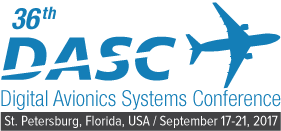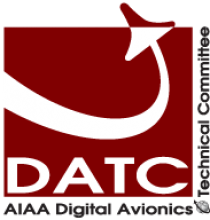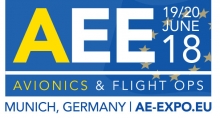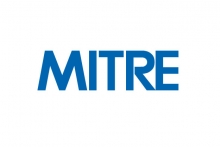Summary
The David Lubkowski Award For Advancement In Digital Avionics
36th DASC Best of Conference Paper
Midair Collision Risk when Executing an Incorrect Approach during Established on Required Navigation Performance Operations
- Mr. Logan M. Branscum (FAA, USA)
- Mr. Cody T. Nichols (FAA, USA)
In recognition of an impressive paper
Best of Track Papers
Aircraft Traffic Management (ATM) Track
Midair Collision Risk when Executing an Incorrect Approach during Established on Required Navigation Performance Operations
- Mr. Logan M. Branscum (FAA, USA)
- Mr. Cody T. Nichols (FAA, USA)
Communication, Navigation and Surveillance (CNS) Track
Comparison of Aircraft State Prediction Methods under Sensor Uncertainty
- James Engelmann (Ohio University, USA)
- Chad Mourning (Ohio University, USA)
- Maarten Uijt de Haag (Ohio University, USA)
Cyber, Systems & Software Track
Flight Critical Software and Systems Development Using ASSERT™
- Kit Siu (General Electric Global Research Center Niskayuna, USA)
- Abha Moitra (General Electric Global Research Center, USA)
- Michael Durling (General Electric Global Research Center, USA)
- Andy Crapo (General Electric Global Research Center, USA)
- Meng Li (General Electric Global Research Center, USA)
- Han Yu (General Electric Global Research Center, USA)
- Heber Herencia-Zapana (General Electric Global Research Center, USA)
- Mauricio Castillo-Effen (General Electric Global Research Center, USA)
- Shiraj Sen (General Electric Global Research Center, USA)
- Craig McMillan (General Electric Global Research Center, USA)
- Daniel Russell (General Electric Global Research Center, USA)
- Sundeep Roy (General Electric Global Research Center, USA)
- Panagiotis Manolios (Norteastern University, USA)
Human Factors Track
Visual Dominance in Pilots During Recovery from Upset
- Tom Schnell (University of Iowa, USA)
- Chris Reuter (University of Iowa, USA)
- Matt Cover (University of Iowa, USA)
Integrated Modular Avionics (IMA) Track
How to tell configuration-free integrated modular avionics what to do?!
- Bjoern Annighoefer (University of Stuttgart, Germany)
- Marc Riedlinger (University of Stuttgart, Germany)
- Oliver Marquardt (University of Stuttgart, Germany)
Special Topics Track
Development and Evaluation of a New Airspeed Information System utilizing Airborne Doppler Lidar
- Tomoko Iijima (Japan Aerospace Exploration Agency, Japan)
- Naoki Matayoshi (Japan Aerospace Exploration Agency, Japan)
- Jun Matsumoto (Japan Aerospace Exploration Agency, Japan)
- Shoh Ueda (Japan Aerospace Exploration Agency, Japan)
- Eiichi Yoshikawa (Japan Aerospace Exploration Agency, Japan)
- Tsuneharu Uemura (The University of Tokyo, Japan)
- Jorg Onno Entzinger (The University of Tokyo, Japan)
Student Research Competition
1st Place
Performance comparison of different guidance strategies to accomplish CTA during a CDO
- Ramon Dalmau (Technical University of Catalonia (UPC), Spain)
2nd Place
Reconfigurable Filtered OFDM Waveform for Next Generation Air-to-Ground Communications
- Niharika Agrawal (Indraprasth Institute of Information Technology, Delhi, India)
3rd Place
Dynamic Geo-Fence Assurance and Recovery for Nonholonomic Autonomous Aerial Vehicles
- Giovanni Miraglia (University of Tulsa, USA)
4th - 7th Place (In no particular order)
- Jan Vlk (Brno University of Technology, Czech Republic)
- Paul Berthier (Polytechnique Montréal, Canada)
- Subramanian Ramasamy (RMIT University, Australia)
- Jessica Belzer (Ohio University, USA)
Hurricane Irma
We have great news! The 36th DASC Conference Committee has been assured that there are no impacts from Hurricane Irma to the conference hotel or the surrounding area. The hotel is open and has been open for business housing first responders and local residents, and all area airports were re-opened on Tuesday. The downtown waterfront is fully open, and all area restaurants are expected to be open by this weekend. We look forward to welcoming everyone to the DASC.
..
Headlines
...
...
Conference Theme of the 36th IEEE/AIAA Digital Avionics Systems Conference
The conference theme of the 36th DASC is the design of technologies, procedures, and regulations to safely and efficiently accommodate a diverse spectrum of platform types into space and into modern civil airspace systems. Participants will be challenged to show how their work helps to develop, promote, or enable multiple classes of users (Commercial, Civil, General Aviation, Military, Recreational) access to space and global civil airspaces. Civil aviation faces challenges of new requirements and legacy platforms that can be expensive to modernize. The emergence of private and commercial space launch capabilities brings new challenges in technical, regulatory, and security arenas. An increased reliance upon automated systems puts fresh emphasis on the importance of Cyber security across the spectrum of user environments (ground, air, space). The continued growth of Unmanned Systems, especially among Recreational users, remain a significant factor in Air Traffic Management planning and risk mitigation. The progress of Commercial applications for automated transportation and delivery of goods and services (both ground and air) promises exciting capabilities but faces serious challenges in technologies, procedures, and government regulations. General Aviation users will soon include personal vehicles that do not require traditional airport infrastructures. Military aircraft (manned and unmanned) must soon obey the same requirements as Civil and Commercial platforms for domestic and international flight.
...
...
Important Dates
| Abstract Submission | April 20, 2017 | IEEE Publication Policies |
| Abstract Acceptance Notification & Invitation to Submit Draft Paper | May 1, 2017 | Author Instructions (No Peer Review) Author Instructions (Peer Review) Author Instructions (Posters) |
| Full Paper Submission Deadline (If Peer Review is Requested) | June 1, 2017 | Author Instructions (Peer Review) |
| Proposal for Special Sessions | June 30, 2017 | Call for Special Sessions |
| Peer Review Feedback and Author Notification | July 15, 2017 | |
| Full Paper Submission Deadline (for Award Eligibility) | July 28, 2017 | |
| Full Paper Submission Deadline (Not Award Eligible) | August 7, 2017 | |
| Final Presentation, Copyright, and Conference Registration Deadline | August 7, 2017 | Registration |
| Student UAS Competition Registration | September 19, 2017 | Student UAS Competition |
...
...
Tracks
Track 1. Air Traffic Management (ATM): traffic flow management; spacing, sequencing, and scheduling; command and control technologies for future air traffic management; separation management; unmanned aircraft system traffic management (UTM) inspired air traffic management for new entrants; simulation and modeling needs.
Track 2. Communications, Navigation, and Surveillance (CNS): communication systems; air/ground data link; airport communications; satellite-based communications; optical communications; global navigation satellite systems (GNSS); alternative positioning navigation and timing (APNT); performance-based navigation; augmentation systems for navigation; inertial navigation; surveillance systems; collision avoidance systems.
Track 3. Unmanned Aircraft Systems (UAS): issues, challenges, and opportunities in emerging UAS developments; UAS system design, applications, mission optimization, and all aspects of UAS Traffic Management (UTM), and UAS integration into all classes of airspace.
Track 4. Integrated Modular Avionics (IMA): allocation/configuration/integration process and tools for IMA; model-based system engineering; system resources and performance; verification; certification; system architecture; scalability; interpartition interference on multicore processors; assessing system demand and resource availability; mitigation of common mode failures; system maintenance; wired/wireless communication related to partitions; health monitoring; optimization techniques.
Track 5. Human Factors (HF): issues on human interaction with automation such as mode awareness, flight deck displays, and decision support tools; assessment and modeling of human performance, such as methods for avoiding the presentation of hazardously misleading information, and information abstraction and conveyance concepts that enable appropriate levels of workload and crew coordination.
Track 6. Cyber, Systems, and Software (CSS): design, testing, verification & validation, and certification of complex aviation systems; avionics cyber security; cyber-physical security threat assessment and mitigation development; safety and security risk assessment and management; safety-critical or large-scale software system development and integration; aeronautical network security; unmanned aerial vehicle (UAV) cyber security; next-generation air traffic management security.
Track 7. Special Topics (ST): included are emerging topics that do not fit in the other tracks, and do not yet merit a separate track. For 2017, these topics include: emerging systems architectures, engineering, and systems for safety-critical avionics; avionic information systems and technologies for flight/ground systems, mission planning, and operations; risk management methods; computer aided design; safety in avionics and safety validation; Doppler Lidar; machine learning; electromagnetic immunity; area navigation (RNAV), and required navigation performance (RNP) methods.












